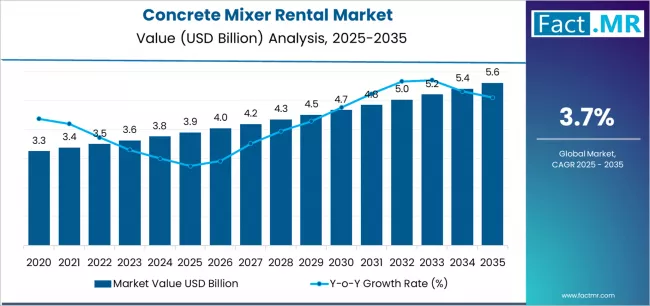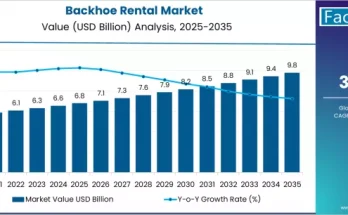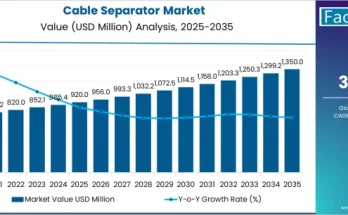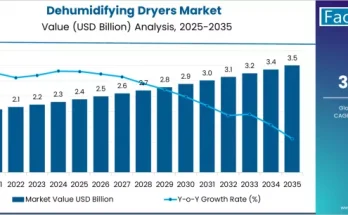The construction industry continues to evolve with growing urbanization and infrastructure development. One significant trend supporting this evolution is the rise of concrete mixer rental services. These rentals provide construction companies, contractors, and small-scale operators access to specialized equipment without the high costs of ownership. The concrete mixer rental market offers flexible, cost-effective, and efficient solutions for a wide range of construction applications, from residential projects to large-scale infrastructure developments.
Market Overview:
Concrete mixer rentals encompass towable, portable, and truck-mounted mixers designed to meet various construction needs. Towable mixers are particularly popular due to their mobility and ease of transportation, making them suitable for multiple project sites. Small-capacity mixers, typically below 200 liters, are widely used for residential and landscaping applications, while medium and large-capacity mixers serve commercial and infrastructure projects.
The rental model allows contractors to access state-of-the-art equipment without the financial burden of purchasing and maintaining machinery. Additionally, rental services provide operational support, maintenance, and logistics management, enabling contractors to focus on project execution rather than equipment upkeep.
Key Market Drivers:
Several factors are fueling the growth of the concrete mixer rental market:
- Construction Industry Expansion:The global increase in residential, commercial, and infrastructure projects is driving demand for flexible concrete mixing solutions. Rental services allow companies to scale operations according to project size and requirements.
- Cost Efficiency:Renting mixers reduces upfront capital expenditures and lowers maintenance costs. Contractors can allocate resources more effectively while maintaining access to high-quality equipment.
- Project Flexibility:Rental services cater to varying project requirements. Towable and portable mixers provide operational flexibility, allowing on-demand concrete production at diverse job sites, including remote or confined locations.
- Technological Advancements:Modern rental fleets incorporate digital tracking, GPS monitoring, and automated maintenance alerts. These technologies optimize equipment utilization and reduce downtime, improving overall project efficiency.
Equipment Configurations:
Concrete mixers come in different configurations tailored to specific needs:
- Towable Mixers:Popular for their transport convenience, these mixers can be easily moved between sites using standard vehicles.
- Portable Mixers:Designed for smaller or restricted spaces, portable mixers are ideal for residential projects or minor commercial work.
- Truck-Mounted Mixers:These units cater to large-scale construction projects requiring continuous and high-volume concrete production.
Capacity options also vary: small mixers under 200 liters are common for precise, small-batch applications; mid-range mixers (200–500 liters) support medium-scale projects; and large-capacity mixers are deployed for major commercial or infrastructure developments.
Applications and End-Use:
The construction sector remains the primary end-user of concrete mixer rentals. Residential construction, including foundations, sidewalks, and landscaping, benefits from small-capacity mixers. Medium and large-capacity mixers are utilized in commercial buildings, road construction, and other infrastructure projects. Additionally, rental services cater to DIY enthusiasts and small contractors seeking specialized solutions for repair, maintenance, and small-scale construction tasks.
Operational and Technological Trends:
Modern concrete mixer rental services are embracing advanced technologies to enhance customer experience and operational efficiency. Digital platforms allow users to book equipment based on capacity, power source, and delivery location. Remote monitoring systems provide real-time status updates, fuel levels, and maintenance alerts. These innovations ensure timely availability, reduce equipment downtime, and enhance project productivity.
Environmental considerations are also influencing equipment choices. Electric mixers reduce emissions and noise, making them suitable for urban areas, while diesel-powered units provide extended runtime and mobility for remote sites. Hydraulic drive systems and adjustable discharge chutes improve mixing efficiency and placement flexibility, catering to diverse project requirements.
Challenges and Market Considerations:
Despite growth opportunities, the concrete mixer rental market faces certain challenges. Transportation and logistics costs can affect rental pricing and service availability. Regulatory compliance across regions adds complexity to equipment deployment. Moreover, competition from equipment purchase options may influence adoption rates among certain contractors.
However, rental providers are addressing these challenges by offering flexible rental terms, operational support, and certified, high-quality equipment to maintain reliability and client trust.
Conclusion:
The concrete mixer rental market is transforming how construction projects are executed. By offering cost-effective, flexible, and technologically advanced solutions, rental services empower contractors and businesses to manage resources efficiently while maintaining high standards of quality. As urbanization, infrastructure development, and construction activity continue to grow, concrete mixer rentals will remain an essential component of modern construction operations, enabling precise, on-demand concrete production across diverse project scales.
Accessing comprehensive market insights can guide construction companies, contractors, and DIY operators in selecting the right rental solutions for their project requirements, ensuring operational efficiency and long-term growth.
Browse Full Report: https://www.factmr.com/report/concrete-mixer-rental-market



